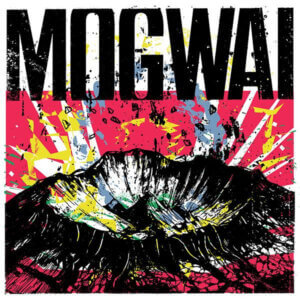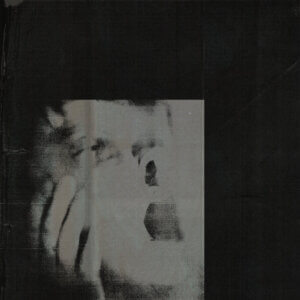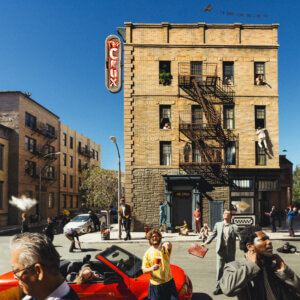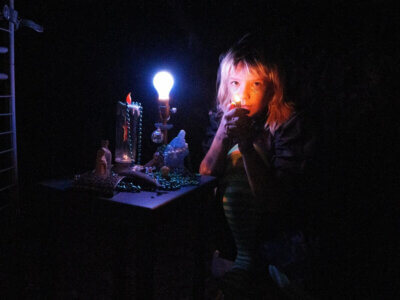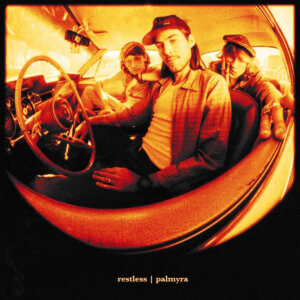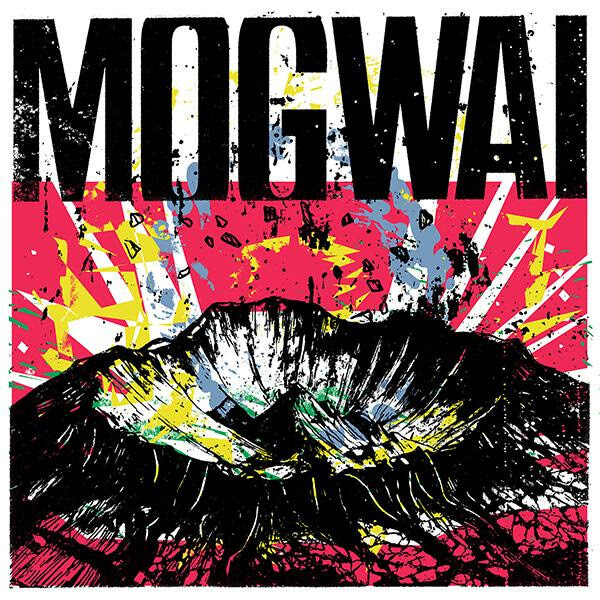
6.5
The Bad Fire
Mogwai
The dynamic, soaked-in-synth, and distorted instrumental sections, as well as the occasional muffled, vocoded vocals, one always hears in a Mogwai record are definitely present in their eleventh studio album The Bad Fire. Lush guitars that encourage the listener to focus on every single pluck and thrash; a steady drum that guides the music through a trance-like state; piano melodies and synths that capture every mood from sunny hopefulness, to sullen melancholy, outright emotional chaos: The Bad Fire consists of symphonic movements rather than tracks. Simply put, it’s a record with flow, hills and valleys of emotions, and most importantly, some excellent, powerful guitar sections.
The Bad Fire is yet another great display of musical craftsmanship by the band, and it’s certainly a departure from the grungy, shoegaze-y tone of 2021’s As The Love Continues. Mainly, The Bad Fire draws its playing style, construction, and sound design from much of the indie music of the 2000s-early 2010s. Yet, Mogwai’s latest record doesn’t try to give a much-needed, ten-year update. Instead, it reads like a fan-made reinterpretation of all the bygone era’s greatest hits. One
can hear the new album and tease out all its influences—some Ratatat and Crystal Castles here, some M83 and MGMT there, a bit of Phoenix and Arcade Fire everywhere—but, barring a few standout tracks, sadly the only thing that’d remain would be solid technical skills and a pleasant, albeit verging on generic, sound.
The record begins with “God Gets You Back,” the first single to be released this album cycle. Just shy of seven minutes in length, the introductory track already piles on the rippling synths, spacey warbles, and, of course, the fried, manipulated vocals that bleed into rest of the instrumentals. The song has adrenaline: it gradually ramps up the volume, density, and electricity like a building wave, preparing to crash into that final, buzzing, singular sustained note and transition into “Hi Chaos.” But even though the progression adeptly sucks the listener into the world of The Bad Fire, it doesn’t feel like a song that would have been made in the 2020s. Its structure seems to mirror Phoenix’s “Love Like A Sunset, Pt. I,” or even M83’s “Intro” into “Midnight City”—two songs notably made over ten years ago. The buildup of the electronic music, compounded with the affinity for interspersed booms and “epic” drops and thrashes of the electric guitar: these dramatic opening movements that set up the next song have essentially become tropes in the canon underground electro-indie records of the 2000s-early 2010s.
Perhaps the most ‘I-feel-like-I’ve-heard-this-before’ track is “Fanzine Made Of Flesh,” which was also one of the leading singles prior to The Bad Fire’s release. It’s certainly the rockiest: it opts for a more traditional band setup with mostly pedal distortion and only a touch of baroque pop-esque synths in the background, and it prominently features Stuart Braithwaite’s autotuned vocals that one could possibly sing along to (if they can make out the lyrics.) It also feels steeped
in euphoria, as well as an indescribable sense of sublime and yearning that can’t be explained by the lyrics, which sets itself apart from the previous, more melancholic and hypnotic songs. However, “Fanzine Made Of Flesh” is euphoric in almost the same way that MGMT’s “Kids” is, or even slightly similar to Ratatat’s “Seventeen Years.” While Mogwai’s song is too new to be lumped in with the other two iconic tracks, its swelling grandeur, catchy chorus hook that feels misty and ghostly but metallic at the same time, and explosive energy that makes the listener want to throw their body around in ecstasy comes off as wanting to reproduce those unique feelings the songs from almost 20 years ago mastered. (It also doesn’t help that the specific distortion used for the voice in “Fanzine Made of Flesh” sounds like Mogwai *really* misses Daft Punk, which…fair. We all do.) The title becomes literal in this way: Mogwai’s body of work—The Bad Fire, in this case—has become a cut-and-paste collage of the best hits of the indie scene. And while it’s a well-produced zine that mimics the sounds of a great era in indie rock and pop, for the most part, it’s not much more than that.
“Hammer Room,” however, is the bright, crowning jewel of The Bad Fire. It begins with a staccato piano melody, a string of individual notes pitter-pattering after each other. The introduction of each new instrumental part injects even more energy into the track, like the whole body is warming up to get ready to dance. The first measure that includes the drum and synth gets the head and neck rocking; the gliding of the sci-fi electric guitar forces one’s eyes to open in intrigue and content. Soon the whole band is playing, the grove is in full swing, and it doesn’t seem like this techno party-meets-lyrical ballet is going to end. Throughout “Hammer Room,” the members ebb and flow like a jazz quartet would, allowing each instrumental section to take center stage, if just for a bit. There’s a beautiful unity found in the mashing of parts not seen in much of the record, and it’s the first time here that a new sound from Mogwai seeps through the cracks.
“Pale Vegan Hip” also deserves some credit: it’s a meditative track that, for the first half, enters a trance-like state through a somber, slow guitar melody. Then, right about the halfway point in the melancholy, a wobbly synth weasels its way to the forefront. It’s surprising, it adds texture to the track, and it effectively snaps the listener back into listening intently to the music. If just for that little scratch, “Pale Vegan Hip” offers a moment of excitement for unexpected sounds, and its quirky enough to contrast and challenge the orchestral-influenced, clean, and super-composed aesthetics of the record’s musical inspiration.
It’s frustrating to listen to a Mogwai record and not have one’s mind completely blown away by it. In an industry that’s so insistent upon lyrics, clean and easily comprehensible melodies, and catchy hooks and rhythms, Mogwai has always been this maverick that underscores the beauty and importance of good composition. Yet The Bad Fire is also somehow a nostalgic record, using the past as a tether instead of a springboard to help them move forward.
Order The Bad Fire by Mogwai HERE
Latest Reviews
Tracks
Related Albums
Related News
Advertisement
Looking for something new to listen to?
Sign up to our all-new newsletter for top-notch reviews, news, videos and playlists.
